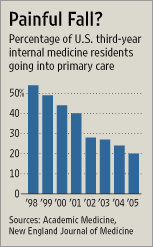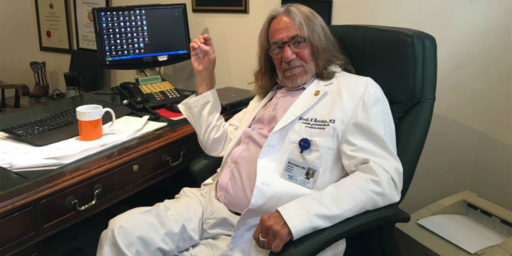Dr. Jill Biden Redux
Charles C.W. Cooke argues that Joe Biden’s wife’s insistence on being referred to as “Dr. Jill Biden” despite having a doctorate in education leadership rather than a medical degree is obnoxious and constitutes ”pretending to be a doctor.” Glenn Reynolds and Virginia Postrel concur.
I dealt with this four years ago and my views haven’t substantially changed. The nickel version:
- The title “doctor” comes from the Latin “to teach,” and was used by scholars for centuries before the medical profession glommed on to it to raise their prestige. (Physicians were quack healers until relatively recently.)
- Biden’s doctorate is legitimate and earned.
- It’s nonetheless cheesy to insist on being called “Doctor” outside one’s professional circles.
- Doctorates in education, and educational leadership in particular, are not held in particularly high esteem in the scholarly community.
What I would add is that, while I respect the professional accomplishments of physicians and dentists and have no objection to their being addressed as “doctor,” it’s a rather different sort of accomplishment. Achieving those credentials requires mastering a set body of knowledge and demonstrating some technical skills. An academic doctorate requires mastery of a body of material as well as conducting substantial original research that expands the body of knowledge in a field.
Regardless, the notion that a physics PhD shouldn’t be called “doctor” because they can’t perform brain surgery is as silly as the notion that a podiatrist shouldn’t be called “doctor” because they can’t perform a root canal. The very nature of specialized expertise is that it’s, well, specialized.







Why?
Senators and Congresspeople, for instance, want to be called “Senator Smith” and “Congresswoman Jones”, rather than Mr. Smith and Ms. Jones, by people who are not in their professional political circles. Is that similarly cheesy?
@Rafer Janders: Pretty much. I don’t mind in when they’re acting in a professional capacity–including appearing on the various talking head shows–but it’s pretty cheesy to expect special treatment in everyday life.
@Rafer Janders:
And then they insist on still being addressed by that title years after they leave office. Newt Gingrich hasn’t been Speaker of the House since 1998, and still gets called “Speaker Gingrich.”
@James Joyner:
OK, well, as long as you’re consistent I’ll agree with you. What always sets me off is when medical doctors or Congresspeople call me by first name, and then act surprised when I respond with their first name, rather than calling them “Dr. Smith” or “Congressman Jones”.
My simple rule: don’t use my first name unless we’re personally acquainted, but if you do use my first name, I’m using your first name. If you want me to address you with your title, then you must similarly refer to me as Mr. Janders and not as Rafer.
I actually have far less of a problem with PhDs referring to themselves as doctor than I do with physicians doing so.
@Doug Mataconis:
God I hate that. It’s like some badge of nobility, which, as far as I can remember, is supposed to be un-American. It was the same with people calling Romney “Governor Romney” rather than the correct “Mr. Romney.” There’s only one governor of Massachusetts, and his name is Deval Patrick. Romney was governor of nowhere and of no-one, and should not have been referred to as such.
And for senior military ranks? Perhaps it’s just my exposure, but colonels and above tend to have their titles permanently attached after retirement. It’s the same with ambassadors.
@John Burgess: Pretty much the same there: I’m fine in a professional setting, otherwise not so much. If a retired general or ambassador is appearing as an expert commentator on something where they have expertise, the title helps convey that expertise. If they’re working as a VP as a defense firm or as a lobbyist, or whatever, then “Bob” will do.
@Rafer Janders:
It’s mainly a cultural thing. Most young academic’s began stopping using “Dr.” in the 60’s and 70’s. By today it’s almost universal — especially in the humanities and social sciences.
Part of the rational is that a lot of PhD’s believe that their work, versus their rank, is what should communicate their level of education.
Perhaps the only exception I’ve seen — outside of medical schools — is people who achive PhD’s in divinity and go on to preach and people in certain hard sciences. Oh, and sadly, Higher Ed Administration. Don’t ask me why — though I have my own theories — but administrators are more likely than actual professors to ask to be addressed as “Dr.”
Someone should ask Glenn Reynolds what he thinks of his own wife routinely referring to herself as “Dr. Helen Smith” on the basis of her PhD in psychology, which is not a medical degree either.
@Stormy Dragon:
e.g:
http://pjmedia.com/drhelen/
@Stormy Dragon:
It’s simple, his wife isn’t a Democrat.
@matt bernius: It depends on the subculture. My sense is that academics in the West and Northeast tend not to use the title “Doctor,” preferring instead to go by “Professor.” In the South and Midwest, by contrast, they tend to prefer “Doctor.” In the Southern schools where I taught, the only people who went by “Professor” were the ones who didn’t have PhDs.
Additionally, in government–especially military–circles, PhDs tend to use “Doctor” to offset the fact that others have military ranks titles.
@PJ:
Heh. Indeed.
Is it possible to get a doctorate on line? I mean one that is legitimate from an accredited school?
Are government funds available for a doctorate ?
I usually make it a habit to call people by what they wish to be called regardless of my private opinion. I do not wish to be the title police. I don’t know Dr Biden’s background but I do know many people who worked hard for their education attainment, may be the first in their families to achieve a PhD or MD, and are darn proud of it. I usually err on the side of celebrating with them.
Speaking as someone with a Ph.D., I prefer be addressed as Ms., or by my first name by those who know me well enough to do so. I can live with being addressed as “Professor” inside the classroom, but outside it…no.
I don’t know any Ph.D.s who insist on being called “Dr.” I DO know many Ed.D.s who do insist on being called “Dr.”
I would hazard a guess that the reason that she is referred to as Dr. Biden is this:
She received her doctoral degree in 2007, relatively late in life, and at that time people addressed her with that honorific to recognize that recent accomplishment, in the same way that you might greet a recent recipient of a doctorate with “Congratulations, Dr. Smith!”
Shortly thereafter, in 2008, Sen. Biden joined the Obama ticket, which made her nationally prominent. At that time she chose to stick with “Dr.”, both to avoid the minor public drama that might ensue if she asked to be referred to differently (“Doesn’t Dr. Biden value education? Apparently not, if she finds her degree so embarrassing”), and because it’s marginally useful to remind people of her degree in connection with her advocacy for community colleges.
In any event it hardly seems worth worrying about.
@Rafer Janders:
It is if you are a female senator from California, apparently. “Elaine Donnelly, president of the Center for Military Readiness, agreed that Mrs. Boxer was out of line and said she’s “embarrassing herself by showing hypersensitivity and insecurity that is unbecoming to a United States senator from the great state of California.” ”
I think the whole flap about Dr. Jill Biden is much the same thing. It’s not really about what you call her, it’s an opportunity for the ideological opponents of her husband to show their tribalism by mocking someone from the other camp.
When one is addressing another, it is good etiquette to refer to them by a title that they have earned or held — traditionally, the most exclusive title. For example, It’s not Bill and Hillary or Governor and Senator Clinton, it’s President Clinton and Secretary Clinton. Likewise, those who left military service honorably are called by their final rank.
On the other hand, those who insist on their titles are, usually, insecure about themselves and need the reassurance. See SENATOR Boxer, who chewed out a general for calling her “ma’am” — which is traditional for members of the military addressing a female superior.
At least, that’s how I’ve always understood it.
And I’ve always enjoyed the classic definition of the degrees:
B.S.: Bull ____
M.S.: More ____
Ph.D.: Piled higher and Deeper
It’s a great way to test how overseriously the degree holder takes themself.
@Rafer Janders:
Well, Romney was actually governor of Mass. for a full term. As far as I’m aware, he doesn’t insist on being addressed as “Governor” now.
@Jenos Idanian #13:
Earned, yes. Held, no. So, for example, Henry Kissinger is “Dr. Kissinger” his whole life, but “Secretary Kissinger” only while he was actually Secretary of State. The moment he gives up that office, he reverts from “Secretary Kissinger” back to “Dr. Kissinger.” Same with Romney — “Governor Romney” while he was governor of Massachusetts, but “Mr. Romney” from the moment he steps down.
@CSK:
I dunno, people called him “Governor Romney” throughout the campaign and I never noticed him correcting them.
@matt bernius: @James Joyner: This (as James knows, since we shared it) my exact experience as well.
@Stormy Dragon: May I second that Heh. Indeed?
@Jenos Idanian #13:
Actually, no, it’s much more complicated than that. There’s a distinction between those who left service via honorable discharge (and thus can still be called up) and those who are actually retired after 20 plus years of service. In addition, rank is generally is only retained by active or reserve officers if they received a regular commission.
The context and purpose in which former rank is used is also key, so if for example a former officer is now in the private sector, particularly a sector that does a lot of work with the government, then the use of military rank and title is quite possibly illegal per DoD regulations. At the Pentagon, therefore, retired general officers who work in the private sector are always formally referred to as “Mr.” or “Ms.” rather than as “General” or “Admiral”. (This rule was adopted to prevent former officers from using their rank to get an unfair advantage bidding for government contracts).
Apologies for the self reference, but for an example of this, see: @Jenos Idanian #13:
@KariQ: A worthy self-ref that is on the nose.
@Jenos Idanian #13:
No, again that’s wrong. It’s Mr. Clinton and Ms. Clinton, though, since we make a special case for ex-presidents, I might call Bill Clinton “Mr. President” when addressing him by name. With Hillary Clinton, though, I’d use “Ms. Clinton.” Government titles are not retained after the post is resigned.
James, this whole thing is a tempest in a teapot. You should know better, although hiring Doug M would seem to indicate otherwise. Who honestly gives a sheet?
@Rafer Janders: What I said is what I’ve always understood to be basic common courtesy, and seems to be fairly consistent. The retired military thing you cited seems to be a specific exception with good purpose, and I can definitely understand that one.
And the Kissinger one… I think he might be another exception, this one an individual one. Now that you bring him up, he’s been “Dr. Kissinger” as long as I can remember.
Dang… I was thinking maybe it’s just elected office and military rank, not appointees, but I seem to recall quite a few former ambassadors still going by that title long after leaving service.
I’ll still stick with my observation, though — the more someone insists on being addressed by title, the more insecure they tend to be. Or, just plain jerks.
Signed,
Lord Jenos, Duke of My Domain
@Doug Mataconis: I think Gingrich’s title is well deserved. He does, after all, speak a lot. Way too much if you ask me.
What always amused me was the use of “The Honorable”. True it was formal situations but really honorable is not something one associates with presidents, senators, congresspeople or Secretaries. So when it is used, it just seems sad and like highlighting the fact reality is the opposite.
Of course, military retirement, especially at senior ranks is really reduced pay for reduced services and the individual is subject to recall. Of course, modern reality is after a few years, recall is unlikely but general officers have a longer shelf life.
As for Ph.Ds, well it is amusing when they get huffy. Especially, if you aren’t on campus and they aren’t faculty. Otherwise, it is “Whatever, where’s my latte?”
@Scott: “I usually err on the side of celebrating with them.”
That is a lovely way of looking at it, and I will do my best to remember this phrasing for the rest of my life. Thank you.
@Jenos Idanian #13: “It’s a great way to test how overseriously the degree holder takes themself. ”
Yeah, I guess it’s easy to feel that way if you’ve never gotten around to finishing that GED.
Contempt for people more accomplished is the first sign of a true dolt. Contempt for accomplishment itself is the hallmark of the mouthbreathers who become brown shirts.
@Rafer Janders: “The moment he gives up that office, he reverts from “Secretary Kissinger” back to “Dr. Kissinger.” ”
And if there were any justice in the world, he’d revert to “prisoner number 94567.”
@CSK:
I went to grad school with 2 people who later married each other and who now work in the same mental health center… they not only call each other doctor but insist that the rest of the staff do, too.
Feh
So, what were all of these people currently complaining about Dr. Jill Biden saying back when Dr. Condoleeza Rice was in the Cabinet?
What are medical doctors today used to be called surgeons and barbers in the past. The Doctorate in Philosophy predates ‘Doctor of Medicine’a by centuries. If you want to be polite in a professional or formal setting, using ‘Doctor’ to address a Ph.D. is fine. I’ll introduce speakers with their titles at presentations. Also, in news media or articles I think it is very appropriate to use professional titles when discussing items relevant to their expertise. Conditions vary by location. In Germany, a male professor is often addressed as ‘Herr Professor Doctor’.
I’d heard that at one time there was a proposal by a group of medical doctors for a law that would’ve restricted the title of Doctor to medical professionals but that it didn’t get very far, given that many politicians were J.Ds.
@Jenos Idanian #13: “B.S….M.S…..Ph.D……” That’s old! You and I must be from the same era or that joke has hung around a long time. I heard that my first year at college, actually a state university. I think it was also written on half the restroom walls.
I remember exactly a friend’s description of that place: ” a dumping ground for every sorry professor that ever came along!!” And it was that: scandals, drunk professors, everything imaginable and never a dull minute!
@wr: I beg to disagree. Dr. Kissinger was a giant figure in middle east peace, US – Chinese / Soviet Union relations, and the fight against the spread of communism which was a huge threat to the free world during the ’70’s.
Dr. Kissinger set a standard of diplomacy and foreign policy accomplishments against which all secretaries of state are still measured.